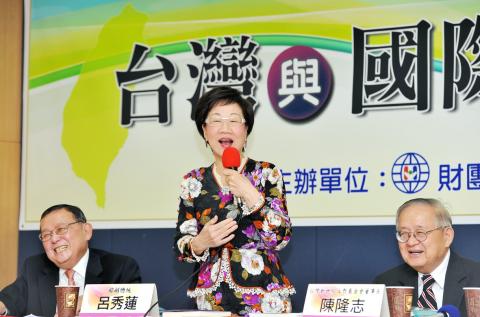Former vice president Annette Lu (呂秀蓮) yesterday reiterated her contention that Taiwan has been an independent country since the nation’s first-ever presidential election was held on March 23, 1996, while its name remained the Republic of China (ROC).
The ROC representing Taiwan was different from the ROC established in 1912 in China because the latter was overthrown by the Chinese Communist Party, which announced the creation of the People’s Republic of China in 1949, Lu said.
“The ROC created in 1912 represented China, and that in 1996 represented Taiwan. Same name, but different entities,” she said.

Photo: Chien Jung-fong, Taipei Times
Lu made the remarks at a forum dedicated to a newly published book that explores ways for Taiwan to join international organizations written by Chen Lung-fong (陳隆豐), doctor of juridical science at New York University School of Law.
The book starts with questions related to the country’s sovereignty, to which Lu gave her answers.
In 1996, 23 million Taiwanese realized “popular sovereignty” by voting in the presidential election, with the help of the US, which dispatched two aircraft carrier battle groups to the Taiwan Strait in response to a series of missile tests and military exercises launched by China to intimidate Taiwan, Lu said.
The 1996 election showed that China had already failed to stop Taiwan from becoming an independent country, Lu said.
It also showed that the US did not oppose the nation’s independence as it has claimed, Lu added.
“Taiwanese independence was achieved in 1996,” she said.
Former deputy minister of foreign affairs Michael Kao (高英茂), who served under the Democratic Progressive Party administration, agreed with Lu that Taiwan meets the criteria for the Westphalian model of sovereignty — territoriality and the absence of a role for external agents in domestic structures — and the criteria set out by the Montevideo Convention on the Rights and Duties of States.
Kao said that two problems needed to be overcome for Taiwan to enjoy statehood status as other nations do: the lack of recognition in the world due to political issues and ambiguity on the part of Taiwanese about their national identity.
The policies pursued by President Ma Ying-jeou (馬英九) since he took office in 2008 in the areas of diplomacy and cross-strait relations and characterized by “diplomatic truce,” the so-called “1992 consensus” and “one country, two areas (一國兩區)” have all hampered people’s awareness of Taiwan’s national identity, Kao said.
Kao said he recently talked to former US deputy secretary of state Jim Steinberg and told him that the US should have made more effort to assist Taiwan’s participation in international organizations, to which Steinberg replied that the US respected the choice Taiwanese made in the presidential election.
Steinberg’s reply showed how important it is to raise awareness of national identity in the pursuit of the normalization of Taiwan’s status, Kao said.

The High Prosecutors’ Office yesterday withdrew an appeal against the acquittal of a former bank manager 22 years after his death, marking Taiwan’s first instance of prosecutors rendering posthumous justice to a wrongfully convicted defendant. Chu Ching-en (諸慶恩) — formerly a manager at the Taipei branch of BNP Paribas — was in 1999 accused by Weng Mao-chung (翁茂鍾), then-president of Chia Her Industrial Co, of forging a request for a fixed deposit of US$10 million by I-Hwa Industrial Co, a subsidiary of Chia Her, which was used as collateral. Chu was ruled not guilty in the first trial, but was found guilty

DEADLOCK: As the commission is unable to forum a quorum to review license renewal applications, the channel operators are not at fault and can air past their license date The National Communications Commission (NCC) yesterday said that the Public Television Service (PTS) and 36 other television and radio broadcasters could continue airing, despite the commission’s inability to meet a quorum to review their license renewal applications. The licenses of PTS and the other channels are set to expire between this month and June. The National Communications Commission Organization Act (國家通訊傳播委員會組織法) stipulates that the commission must meet the mandated quorum of four to hold a valid meeting. The seven-member commission currently has only three commissioners. “We have informed the channel operators of the progress we have made in reviewing their license renewal applications, and

Taiwan People’s Party (TPP) Chairman Huang Kuo-chang (黃國昌) yesterday appealed to the authorities to release former Taipei mayor Ko Wen-je (柯文哲) from pretrial detention amid conflicting reports about his health. The TPP at a news conference on Thursday said that Ko should be released to a hospital for treatment, adding that he has blood in his urine and had spells of pain and nausea followed by vomiting over the past three months. Hsieh Yen-yau (謝炎堯), a retired professor of internal medicine and Ko’s former teacher, said that Ko’s symptoms aligned with gallstones, kidney inflammation and potentially dangerous heart conditions. Ko, charged with

Taiwan-based publisher Li Yanhe (李延賀) has been sentenced to three years in prison, fined 50,000 yuan (US$6,890) in personal assets and deprived political rights for one year for “inciting secession” in China, China's Taiwan Affairs Office spokesman Chen Binhua (陳斌華) said today. The Shanghai First Intermediate People’s Court announced the verdict on Feb. 17, Chen said. The trial was conducted lawfully, and in an open and fair manner, he said, adding that the verdict has since come into legal effect. The defendant reportedly admitted guilt and would appeal within the statutory appeal period, he said, adding that the defendant and his family have